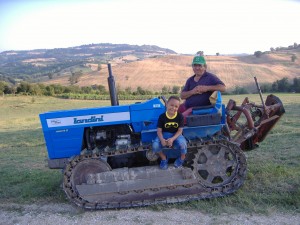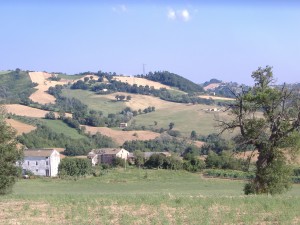We’d seen the signs a couple of time on the road from Macerata. Vino cotto. Easy enough to translate, but what the heck is it? Cooked wine: gotta be more to it than that, surely.
A bit, but not that much, as it turns out. I found out by accident. We locked ourselves out of the house, I had to get to Colmurano to locate the spare key, our own car keys were in the house, of course, but a friendly neighbourhood farmer gave me a lift — and we got talking. Here he is, and no, that’s not what he drove me into town with.
All the local farmers make vino cotto, but the best stuff comes from Loro Piceno, apparently. You heat the must in a large copper pot, down to half the volume. Then you store it in oak casks. For years, occasionally topping up the water. We tried a bit when we got back from getting the spare keys. My friend found some stuff in his garage that he thought was about forty years old. Or maybe fifty, he wasn’t sure. It was sweet but not too sweet, thick but not too thick, with a kind of burnt, caramelized, vaguely nutmeggy feeling to it. Hard to take in quantity on a hot summer day, but perfect for a cold winter night, I’m sure.
Wikipedia has some information on vino cotto, but the Italian version is much better than the English. And you can see the whole process on Casey Cole’s blog on low-carbon living in the Marche. 1
Over his vino cotto, and then also his red wine, of which I ended up taking home a gallon, the farmer told me about what it’s like to till the land in the Marche. This is what the landscape looks like: that’s his alfalfa field in the foreground, and his farmhouse on the left. What you can’t see is his wheat, ready to harvest, and his sunflowers. 2
It’s a hard life. He can’t really make ends meet. The fodder (straw and alfalfa hay) gets trucked up north as nobody has any cattle around there now. A few sheep, maybe, that’s all. The local cheese is a nice pecorino, but the women don’t make it anymore. Kids aren’t interested in life on the land, just motorinos and smack. They used to have 24 people working on the farm, now it’s just him and his brother, two retirees. Skyrocketing agricultural prices? News to them. But at least they have their vino cotto.

